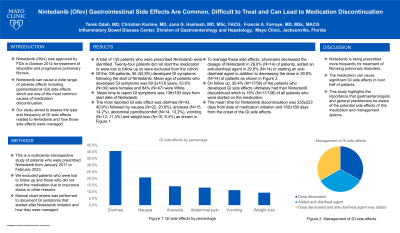Tuesday Poster Session
Category: Colon
P3002 - Nintedanib (Ofev) Gastrointestinal Side Effects Are Common, Difficult to Treat and Can Lead to Medication Discontinuation
Tuesday, October 24, 2023
10:30 AM - 4:00 PM PT
Location: Exhibit Hall

Has Audio

Tarek Odah, MD
Mayo Clinic
Jacksonville, FL
Presenting Author(s)
Tarek Odah, MD, Christian Karime, MD, Jana G.. Hashash, MD, MSc, FACG, Francis A. Farraye, MD, MSc, MACG
Mayo Clinic, Jacksonville, FL
Introduction: Nintedanib (Ofev) was approved by FDA in October 2014 for treatment of idiopathic and progressive pulmonary fibrosis. Nintedanib can cause a wide range of adverse effects including gastrointestinal (GI) side effects which are one of the most common causes of medication discontinuation. Our study aimed to assess the type and frequency of GI side effects related to Nintedanib and how those side effects were managed.
Methods: This is a multicenter retrospective study of patients who were prescribed Nintedanib from January 2017 to February 2023. We excluded patients who were lost to follow up and those who did not start the medication due to insurance status or other reasons. Manual chart review was performed to document GI symptoms that started after Nintedanib initiation and how they were managed.
Results: A total of 130 patients who were prescribed Nintedanib were identified. Twenty-four patients did not start the medication or were lost to follow up so were excluded from the cohort. Of the 106 patients, 56 (52.8%) developed GI symptoms following the start of Nintedanib. Mean age of patients who developed GI symptoms was 69.3±10.6 years, 53.6% (N=30) were females and 84% (N=47) were White. Mean time to report GI symptoms was 138±183 days from start date of Nintedanib. The most reported GI side effect was diarrhea (N=43, 40.6%) followed by nausea (N=22, 20.8%), anorexia (N=15, 14.2%), abdominal pain/discomfort (N=14, 13.2%), vomiting (N=12, 11.3%) and weight loss (N=10, 9.4%). To manage these side effects, physicians decreased the dosage of Nintedanib in 29.8% (N=14) of patients, added an anti-diarrheal agent in 29.8% (N=14) or starting an anti-diarrheal agent in addition to decreasing the dose in 29.8% (N=14) of patients. On follow up, 30.4% (N=17/56) of the patients who developed GI side effects ultimately had their Nintedanib discontinued which is 16% (N=17/106) of all patients who were started on the medication. The mean time for Nintedanib discontinuation was 235±223 days from date of medication initiation and 160±189 days from the onset of the GI side effects.
Discussion: Nintedanib is being prescribed more frequently for treatment of fibrosing pulmonary disorders. The medication can cause significant GI side effects in over half of patients. This study highlights the importance that gastroenterologists and general practitioners be aware of the potential side effects of this medication and management options.
Disclosures:
Tarek Odah, MD, Christian Karime, MD, Jana G.. Hashash, MD, MSc, FACG, Francis A. Farraye, MD, MSc, MACG. P3002 - Nintedanib (Ofev) Gastrointestinal Side Effects Are Common, Difficult to Treat and Can Lead to Medication Discontinuation, ACG 2023 Annual Scientific Meeting Abstracts. Vancouver, BC, Canada: American College of Gastroenterology.
Mayo Clinic, Jacksonville, FL
Introduction: Nintedanib (Ofev) was approved by FDA in October 2014 for treatment of idiopathic and progressive pulmonary fibrosis. Nintedanib can cause a wide range of adverse effects including gastrointestinal (GI) side effects which are one of the most common causes of medication discontinuation. Our study aimed to assess the type and frequency of GI side effects related to Nintedanib and how those side effects were managed.
Methods: This is a multicenter retrospective study of patients who were prescribed Nintedanib from January 2017 to February 2023. We excluded patients who were lost to follow up and those who did not start the medication due to insurance status or other reasons. Manual chart review was performed to document GI symptoms that started after Nintedanib initiation and how they were managed.
Results: A total of 130 patients who were prescribed Nintedanib were identified. Twenty-four patients did not start the medication or were lost to follow up so were excluded from the cohort. Of the 106 patients, 56 (52.8%) developed GI symptoms following the start of Nintedanib. Mean age of patients who developed GI symptoms was 69.3±10.6 years, 53.6% (N=30) were females and 84% (N=47) were White. Mean time to report GI symptoms was 138±183 days from start date of Nintedanib. The most reported GI side effect was diarrhea (N=43, 40.6%) followed by nausea (N=22, 20.8%), anorexia (N=15, 14.2%), abdominal pain/discomfort (N=14, 13.2%), vomiting (N=12, 11.3%) and weight loss (N=10, 9.4%). To manage these side effects, physicians decreased the dosage of Nintedanib in 29.8% (N=14) of patients, added an anti-diarrheal agent in 29.8% (N=14) or starting an anti-diarrheal agent in addition to decreasing the dose in 29.8% (N=14) of patients. On follow up, 30.4% (N=17/56) of the patients who developed GI side effects ultimately had their Nintedanib discontinued which is 16% (N=17/106) of all patients who were started on the medication. The mean time for Nintedanib discontinuation was 235±223 days from date of medication initiation and 160±189 days from the onset of the GI side effects.
Discussion: Nintedanib is being prescribed more frequently for treatment of fibrosing pulmonary disorders. The medication can cause significant GI side effects in over half of patients. This study highlights the importance that gastroenterologists and general practitioners be aware of the potential side effects of this medication and management options.
Disclosures:
Tarek Odah indicated no relevant financial relationships.
Christian Karime indicated no relevant financial relationships.
Jana Hashash: Iterative Health – Grant/Research Support.
Francis Farraye: AbbVie – Advisory Committee/Board Member. Avalo Therapeutics – Advisory Committee/Board Member. BMS – Advisory Committee/Board Member. Braintree Labs – Advisory Committee/Board Member. Fresenius Kabi – Advisory Committee/Board Member. GI Reviewers – Independent Contractor. GSK – Advisory Committee/Board Member. IBD Educational Group – Independent Contractor. Iterative Health – Advisory Committee/Board Member. Janssen – Advisory Committee/Board Member. Pfizer – Advisory Committee/Board Member. Pharmacosmos – Advisory Committee/Board Member. Sandoz Immunology – Advisory Committee/Board Member. Sebela – Advisory Committee/Board Member. Viatris – Advisory Committee/Board Member.
Tarek Odah, MD, Christian Karime, MD, Jana G.. Hashash, MD, MSc, FACG, Francis A. Farraye, MD, MSc, MACG. P3002 - Nintedanib (Ofev) Gastrointestinal Side Effects Are Common, Difficult to Treat and Can Lead to Medication Discontinuation, ACG 2023 Annual Scientific Meeting Abstracts. Vancouver, BC, Canada: American College of Gastroenterology.
